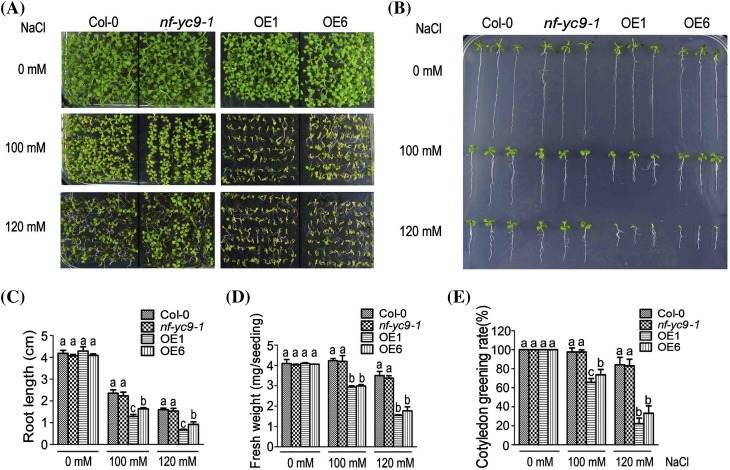Fig. 3.
Over-expression of NF-YC9 results in salt stress hypersensitivity but down-regulation of NF-YC9 expression shows no effect on salt response during post-germination growth. a Post-germination growth of the wild-type Col-0, nf-yc9-1 knockdown mutant and the NF-YC9 overexpression transgenic lines OE1 and OE6 plants. Seeds were directly sown on NaCl-free (0 mM) or NaCl-containing (100 mM, and 120 mM) MS medium, and the growth was investigated 10 days after a stratification at 4 °C for 3 days. The experiments were repeated four times with similar results. b Root growth of the different genotypes as described in (a) growing on NaCl-free (0 mM) or NaCl-containing (100, and 120 mM) MS medium. Seeds were directly sown on the medium, and the root growth was investigated 14 days after a stratification at 4 °C for 3 days. The experiments were repeated four times with similar results. c Statistical analysis of root length of the different genotypes as described in (b). Each value is the mean ± SE of three independent biological experiments, and different letters indicate significant differences at P < 0.05 (Duncan’s multiple range test) when comparing values within the same NaCl concentration. d Statistical analysis of fresh weight (mg/seedling) of the different genotypes as described in (a). Each value is the mean ± SE of three independent biological experiments, and different letters indicate significant differences at P < 0.05 (Duncan’s multiple range test) when comparing values within the same NaCl concentration. e Statistical analysis of cotyledon greening rate of the different genotypes as described in (a). Green cotyledons were recorded 7 days after a stratification at 4 °C for 3 days. Each value is the mean ± SE of three independent biological experiments, and different letters indicate significant differences at P < 0.05 (Duncan’s multiple range test) when comparing values within the same NaCl concentration

